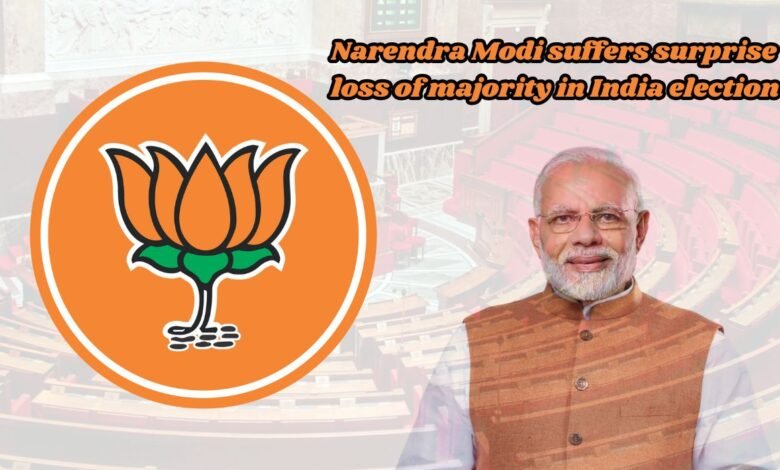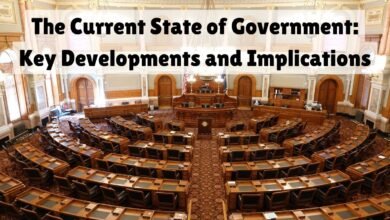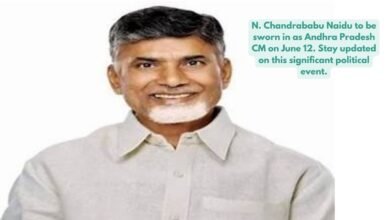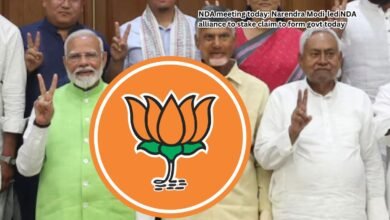Narendra Modi suffers surprise loss of majority in India election
Narendra Modi faces unexpected loss of majority in Indian election, signaling a shift in political dynamics.

The recent Indian election results have taken the nation by surprise, as Prime Minister Narendra Modi and the Bharatiya Janata Party (BJP) lost their majority. This unexpected outcome has significantly altered the political landscape of India, generating widespread discussions and analyses. The BJP, which has enjoyed a dominant position in Indian politics for several years, now faces a new reality as opposition parties gain ground.
The loss of majority by Narendra Modi’s party marks a pivotal moment in Indian politics. This event underscores the dynamic nature of the electorate’s preferences and the challenges faced by even the most established political entities. Analysts are delving into the factors that contributed to this surprising result, examining voter behavior, campaign strategies, and emerging political trends.
The significance of this election outcome cannot be overstated. With the BJP no longer holding a majority, the political balance has shifted. This change has sparked debates regarding the future direction of Indian governance and policy-making. The loss has also prompted introspection within the BJP, as party leaders assess their strategies and plan their next moves.
Overall, the surprise loss of majority by Narendra Modi and the BJP in the recent Indian election has opened a new chapter in the nation’s political narrative. It has highlighted the evolving nature of voter sentiment and the importance of adaptive political strategies. As the country moves forward, all eyes will be on how the BJP and other political parties navigate this transformed landscape.“`
Factors Leading to Narendra Modi’s Unexpected Loss of Majority in Indian Election
Narendra Modi’s unforeseen loss of majority in the recent Indian election can be attributed to a confluence of economic, social, and political factors. One of the primary concerns among voters was the economic slowdown that has plagued the nation over the past few years. Despite various initiatives to bolster growth, the GDP has been sluggish, impacting the livelihoods of millions. Unemployment rates, particularly among the youth, have surged, further compounding public dissatisfaction with the current administration.
The handling of the COVID-19 pandemic also played a crucial role. While the government initially received praise for its swift lockdown measures, the subsequent waves of the virus exposed significant gaps in healthcare infrastructure and crisis management. The oxygen shortages and overwhelmed hospitals left an indelible mark on public sentiment, leading to widespread criticism of the government’s preparedness and response.
Social and political challenges have also been pivotal. Policies such as the Citizenship Amendment Act (CAA) and the revocation of Article 370 in Jammu and Kashmir have been polarizing, stirring significant unrest and protests across various regions. These decisions, while aimed at consolidating national security and identity, have alienated segments of the population, particularly minorities, thereby affecting the party’s broader appeal.
Key events, such as the farmers’ protests against the controversial agricultural laws, have further exacerbated the situation. The prolonged standoff between the government and the farming community highlighted perceived insensitivities towards agrarian concerns, which resonate deeply in a country where a significant portion of the population relies on agriculture for their livelihood.
Public sentiment has undeniably shifted, influenced by these multifaceted issues. The electorate’s desire for change stems from perceived inadequacies in addressing economic distress, social inclusivity, and crisis management. These factors collectively contributed to the Bharatiya Janata Party’s (BJP) diminished standing in the latest election, signaling a call for recalibration of policies and priorities moving forward.
Reactions from the Political Sphere
The unexpected election results have triggered a cascade of reactions across the Indian political landscape. Prime Minister Narendra Modi, in his first statement post-election, expressed his respect for the democratic process and acknowledged the verdict of the people. He emphasized the need for introspection and pledged to continue serving the nation with dedication. Modi’s sentiment was echoed by other BJP leaders, who collectively displayed a tone of resilience mixed with a commitment to analyze the factors contributing to the loss.
Within the Bharatiya Janata Party (BJP), the loss has undeniably impacted morale. Senior leaders are reportedly convening to strategize on the path forward, focusing on rebuilding public trust and addressing the grievances that may have led to the electoral setback. Internal discussions suggest a pivot towards reinforcing grassroots connections and revising policy approaches to better align with the electorate’s expectations. Immediate steps being considered include a comprehensive review of recent policies, enhanced outreach programs, and potential leadership reshuffles to invigorate the party’s image.
Opposition parties, buoyed by the results, have been vocal in their reactions. The Congress party, which has often been the principal opposition, hailed the election outcome as a testament to democratic resilience and a sign of changing public sentiment. Rahul Gandhi, a prominent figure in the Congress, called the results a “victory for the people” and an opportunity to push for more inclusive governance. Regional parties, too, have seized the moment to bolster their stance, viewing the BJP’s loss as a chance to assert greater influence in national politics.
The election outcome has certainly reshaped the political dynamics, placing the opposition in a potentially stronger position while compelling the BJP to recalibrate its strategies. As the political sphere continues to react and adapt, the coming months will be critical in determining the new balance of power within India’s complex political arena.
The unexpected loss of majority for Narendra Modi in the recent Indian election carries significant implications for the country’s future. One immediate consequence is the potential restriction on Modi’s ability to govern effectively and implement his agenda. Without a majority, the ruling party may face challenges in passing legislation, necessitating compromises and coalition-building. This shift could lead to a more fragmented and contentious political environment, where achieving consensus becomes paramount.
Moreover, the loss of majority signals possible changes in the dynamics of Indian politics. Traditional alliances may be reevaluated, and new political forces could emerge as influential players. The necessity for coalition governments might encourage smaller regional parties to wield greater power, thereby diversifying the political discourse. This could lead to a broader representation of interests and voices within the government, reflecting the heterogeneous nature of India’s populace.
The expectations and concerns of the Indian population are varied in this context. On one hand, some segments of society might welcome the increased checks and balances that a coalition government can provide, ensuring that no single party can dominate the political landscape. On the other hand, there are concerns about potential political instability and the government’s ability to address critical issues efficiently. The populace will be closely watching how the new political configurations address pressing challenges such as economic growth, social justice, and national security.
- PM Modi to Rely on Ambitious Allies in Coalition Government
- BJP retains Arunachal Pradesh, SKM re-elected with resounding mandate in Sikkim
This election represents a pivotal moment for India’s democracy. It underscores the vibrancy and unpredictability of democratic processes and highlights the importance of adaptability and coalition-building in governance. As India navigates this new political terrain, the outcomes of this election will play a crucial role in shaping the country’s democratic landscape and its policy directions in the years to come.



